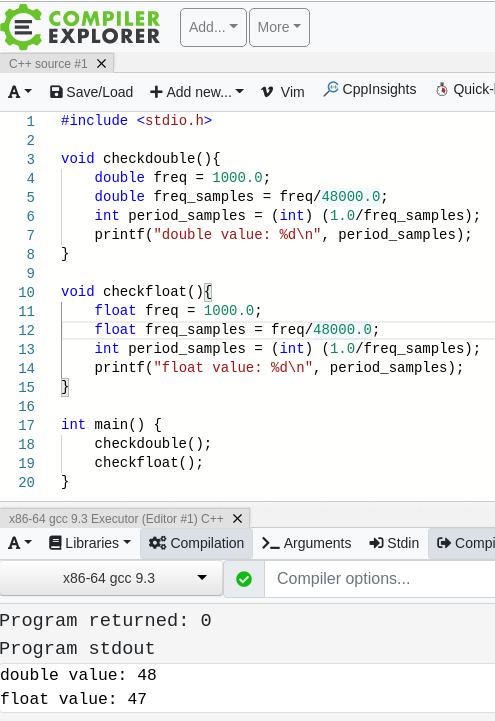GCC -Wconversion: Warnings Everywhere!
2020-04-09
-Wall and -Wextra are actually not, all and extra. Check out -Wconversion
-Wall and -Wextra are actually not, all and extra.
It started in this test ```c++ TEST(LFO, handlesMIDIMessages) { LFO lfo("name");
int f = lfo.getLFOFrequency(); // <- this returns a float
// changes the frequency to some value
lfo.setMIDIParameter(PARAM_0, 30);
ASSERT_NE(f, lfo.getLFOFrequency());
} ```
See int f there. I had just changed getLFOFrequency() to return a float.
But why did I not get a warning for assigning float to int?
Well I don't know WHY, but atleast everyone else is in the same boat: https://stackoverflow.com/questions/24915712/assigning-float-into-int-variable-causes-no-warning.
So the answer is you should use -Wconversion. What comes next is SHOCKING!
(not really, I just added suspense)
These are the warnings that came up when I enabled -Wconversion
We're only interested in the warnings here.
```c++ // USING THE DAFX Formula float thresh = clipping_percent * 32768.0; //WARNING for(uint32_t i=0; i<num_samples; i++){ if(my_abs(inputBuffer[i]) < 0.33thresh){ outputBuffer[i] = inputBuffer[i] * 2; } else if(my_abs(inputBuffer[i]) < 0.66){ float inputScaled = inputBuffer[i] / 32768.0; //WARNING float outputScaled = (3.0 - ((2 - (3.0inputScaled)) * (2 - (3.0*inputScaled)))) / 3.0; //WARNING
outputBuffer[i] = outputScaled * 32768.0;
}
else {
if(inputBuffer[i] < 0)
outputBuffer[i] = -1 * thresh;
else if(inputBuffer[i] > 0){
outputBuffer[i] = thresh;
}
}
}
```
Here there are 3 assignments to floats and they are all : warning: conversion to ‘float’ from ‘double’ may alter its value [-Wfloat-conversion]
Floating point literals are doubles, and to make them floats you can say for example 0.1f. So should I add f to all of my literals? At first I said yes, I need to use floats, because I have a 32-bit processor with a FPU and I want 32-bit floating point numbers, ie floats.
But then I realized something: I'm using a Cortex M7 with a double precision floating point unit. That means I can use doubles!
Continuing on, it turns out, that my sample buffers which were floats, can now be doubles also. In fact, I should use either exclusively doubles or exclusively floats because converting between them requires a conversion instruction.
Converting float <--> double requires a CPU instruction (atleast on ARM Cortex M's)
So use one or the other, float or double.
I had originally made up a typedef float sample_t because I wasn't sure if I wanted to do floating or fixed point. I went with floating point and now
I'm really glad I did the typedef because now I can just change it to typedef double sample_t and that changes in hundreds of places.
See this excellent post to learn more
https://mcuoneclipse.com/2019/03/29/be-aware-floating-point-operations-on-arm-cortex-m4f/
Another Example
So changing float to double removes the -Wconversion warnings, but what if I actually did want to run this code using floats, perhaps on a Cortex-M4 with a single precision FPU? The below uses a bunch of constants and all of them would have to be changed to float literals. Not only to avoid the -Wconversion warning but actually to avoid overhead converting between double and float. Does that mean I have to make all the literals float literals everywhere? There are lots of them, plus it's annoying to see the f.
You know what, while I'm at it, let me add another requirement. I want all those constants to be evalutated at compile time.
c++
// Single precision FPU wants float types eg. when assigning to variables.
// but the literals here are doubles.
void setMIDIParameter(int id, int value){
float delayNumSamples_float = ((float)value/128.0) * 100.0 * (1.0/1000.0) * (48000.0);
To summarize: To compile the above with no warnings for either float or double, no float to double conversion (see the blog post), all the constants evaluated at compile time.
```c++ typedef float sample_t;
void setMIDIParameter(BlockParamIdentifier_t id, int value){ (void)id; #define MAX_DELAY_MILLIS 100.0 #define MILLIS_TO_SECONDS (1.0/1000.0) #define SAMPLES_PER_SECOND 48000.0 #define MAX_INPUT_VALUE 128.0 const sample_t VALUE_TO_SAMPLES = (MAX_DELAY_MILLIS * MILLIS_TO_SECONDS * SAMPLES_PER_SECOND / MAX_INPUT_VALUE);
sample_t delayNumSamples_float = (sample_t)value * VALUE_TO_SAMPLES;
delayNumSamples = (int)delayNumSamples_float;
```
That is what I came up with, resulting in the following. Sorry the name of the function is different here.
asm
delayNumSamples(int):
vmov s15, r0 @ int
vldr.64 d6, .L3
vcvt.f64.s32 d7, s15
vmul.f64 d7, d7, d6
vcvt.s32.f64 s15, d7
vmov r0, s15 @ int
bx lr
.L3:
.word 0
.word 1078116352
For double, and,
asm
delayNumSamples(int):
vmov s15, r0 @ int
vldr.32 s14, .L3
vcvt.f32.s32 s15, s15
vmul.f32 s15, s15, s14
vcvt.s32.f32 s15, s15
vmov r0, s15 @ int
bx lr
.L3:
.word 1108738048
for float.
Neat, in both cases all it does is load the constant, convert the int argument, multiply, convert the return value.
Interestingly I don't have to make the literals float's. If I assign to a const float, ie. const sample_t VALUE_TO_SAMPLES, it doesn't give the warning.
And, no compiler warning.
All of this goes to show that...
Compiler warnings are super important
I avoided a potential bug, made my code more portable, and made it a lot more efficient, learned something about const, looked at some assembly, all as a result of satisfying -Wconversion. That's a win for me.
Here's another one ```c++ typedef double sample_t;
include
//globals for demo purposes uint32_t num_samples = 1024; int delayNumSamples = 10; int delayNumSamples_lastTimeProcessed = 2; int pointless = 0; int i = 3;
void process(void){
float slope = (float)(delayNumSamples - delayNumSamples_lastTimeProcessed) / (float)num_samples;
int interpolatedDelayNumSamples = delayNumSamples_lastTimeProcessed + (int)((float)islope);
pointless = interpolatedDelayNumSamples; //to prevent optimization
}
``
Remember from school, the slope of a line is dy/dx. We want the slope but only have integers.
That is an ugly number of casts.
i is cast to float because of :warning: conversion from 'uint32_t' {aka 'long unsigned int'} to 'float' may change valueislopeis cast back to int because of:warning: conversion from 'float' to 'int' may change value [-Wfloat-conversion]`
It satisfies the warnings but look at the assembly:
asm
process():
ldr r1, .L3
ldr r0, .L3+4
vldr.32 s12, [r1, #8] @ int
vldr.32 s13, [r1, #12] @ int
ldrd r3, r2, [r1]
subs r2, r2, r3
vmov s15, r2 @ int
vcvt.f32.u32 s12, s12
vcvt.f32.s32 s14, s15
vcvt.f32.s32 s13, s13
vdiv.f32 s15, s14, s12
vmul.f32 s15, s15, s13
vcvt.s32.f32 s15, s15
vmov r2, s15 @ int
add r2, r2, r3
str r2, [r0]
bx lr
.L3:
.word .LANCHOR0
.word .LANCHOR1
delayNumSamples_lastTimeProcessed:
.word 2
delayNumSamples:
.word 10
num_samples:
.word 1024
i:
.word 3
pointless:
2 lines of C code using 4 globals takes that much assembly. Could have been worse. Can it be any better? You tell me. We see the cost of using floats and ints interchangably.
3 int to float conversions and 1 float to int conversion. As this is an array operation, it adds significant overhead.
So, it looks ugly and the ugliness itself reveals a performance hit.
Another one. Short ints can easily be overflowed
c++
int sawToothValue = (-127) + (127*ticks*2/T);
currentLFOValue = abs(sawToothValue);
midiMessage.value = currentLFOValue; //warning: conversion to ‘uint8_t {aka unsigned char}’ from ‘int’ may alter its value [-Wconversion]
The thing to note here is that midiMessage.value is a 8 bit value. But currentLFOValue is an int. It's extremely easy to overflow a uint8_t when you're doing calculations with int.
My first reaction is I like putting the explicit cast from int to uint8_t, rather than changing the type of currentLFOValue to uint8_t. It's more explicit,
at the place of assignment, where it could go wrong.
c++
int sawToothValue = (-127) + (127*ticks*2/T);
currentLFOValue = abs(sawToothValue);
midiMessage.value = (uint8_t) currentLFOValue;
Not even the seemingly trivial are excepted.
```c++ float lfoFreqHz;
...
void setMIDIParameter(int id, int value){
lfoFreqHz = value/10.0; //warning: conversion to ‘float’ from ‘double’ may alter its value [-Wfloat-conversion]
}
``
The literal10.0is a double. Same problem as before. Do I make it10.0f, makelfoFreqHzadouble, or what?
Again I like changingfloattosample_t, and making the literal10.0aconst`. It should have a name anyway, I was just being lazy and heuristically picked a number.
```c++ typedef double sample_t;
sample_t lfoFreqHz;
void setMIDIParameter(int id, int value){
const sample_t MIDI_VALUES_PER_HZ = 10.0;
lfoFreqHz = (sample_t)value/MIDI_VALUES_PER_HZ;
}
```
Breaking News: 4 Asserts broken in Unit Test Suite resulting from -Wconversion fixes
Very odd errors too, off by 1 errors. I would first think I accidentally deleted a line or changed a number.
Narrowing it down, I found it was due to the change from float to typedef double sample_t;
Why would changing from float to double give off by 1 errors?


Conclusion: Use -Wconversion
Thanks!